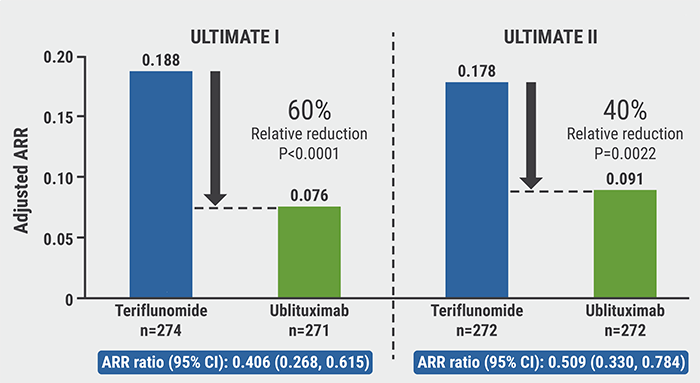ULTIMATE I (NCT03277261) and ULTIMATE II (NCT03277248) are identical phase 3, randomised, multicentre, double-blinded, active-controlled studies. The studies' objective was to evaluate the efficacy and safety of ublituximab compared with teriflunomide in relapsing MS patients [1]. In both trials, participants were randomised 1:1 to intravenous ublituximab every 24 weeks or daily oral teriflunomide for 96 weeks. The primary endpoint was ARR at week 96. Key secondary endpoints included MRI-related outcomes, no evidence of disease activity (NEDA), and 3-month confirmed disability progression.
In both studies, ublituximab was associated with a relative reduction in ARR of 60% (P<0.0001) and 49% (P=0.0022), respectively (see Figure). There was a relative reduction in the total number of Gd-enhancing T1 lesions with ublituximab of 97% and 96%, respectively, relative to teriflunomide (P<0.0001). The relative reduction in the total number of new or enlarging T2 lesions was 92% and 90%, respectively, relative to teriflunomide (P<0.0001). In a prespecified pooled tertiary analysis, there was a 100% improvement in the proportion of patients who reached 12-week confirmed disability improvement (CDI) with ublituximab versus teriflunomide (12% vs 6%; HR 2.158; 95% CI 1.406–3.3133). There was an 88% improvement in 24-week CDI (9.6% vs 5.1%; HR 2.031; 95% CI 1.269–3.248). In ULTIMATE I, 44.6% of patients in the ublituximab group achieved NEDA, which is a relative increase by 198% over teriflunomide (P<0.0001). In ULTIMATE II, 43% achieved NEDA, an increase of 277% over teriflunomide (P<0.0001). Ublituximab had a favourable safety and tolerability profile with no unexpected safety signals.
Figure: ARR at 96 weeks in ULTIMATE I and II trials [1]

ARR, annualised relapse rate.
- Steinman L, et al. Efficacy and safety of ublituximab versus teriflunomide in relapsing multiple sclerosis: Results of the Phase 3 ULTIMATE I and II trials. P15.074, AAN 2021 Virtual Congress, 17-22 April.
Copyright ©2021 Medicom Medical Publishers
Posted on
Previous Article
« Chemosensory dysfunction often persistent after COVID-19 Next Article
Natalizumab versus fingolimod in subgroups of MS patients »
« Chemosensory dysfunction often persistent after COVID-19 Next Article
Natalizumab versus fingolimod in subgroups of MS patients »
Table of Contents: AAN 2021
Featured articles
Letter from the Editor
Interview with AAN President Dr James C. Stevens
COVID-19 and Neurology
The neurological impact of COVID-19
Chemosensory dysfunction often persistent after COVID-19
Pandemic results in decreased global stroke care
Stroke uncommon in critically ill COVID-19 patients
Cognitive Impairment and Dementias
Obstructive sleep apnoea associated with lower cognition
NfL is a better marker for neurodegeneration than T-tau
Monoclonal antibody rapidly reduces brain amyloid
Epilepsy
Extraordinary transformation of epilepsy care in Ontario
No neurodevelopmental effects of foetal antiseizure medication
Migraine and Other Headaches
Long-term safety of atogepant as migraine prophylaxis
Multiple Sclerosis
Dysmetabolism may drive MS progression
Predicting long-term prognosis in paediatric MS patients
Neuromuscular Disorders
Functional and survival benefits of AMX0035 in ALS
Parkinson’s Disease and Other Movement Disorders
Autoimmune mechanisms implicated in Parkinson’s disease
Novel non–D2-receptor-binding treatment for Parkinson’s disease psychosis
Troriluzole for spinocerebellar ataxia
Stroke
Can linoleic acid help prevent stroke?
No association between SSRIs and risk of ICH
Other Topics
Vutrisiran for hATTR amyloidosis with polyneuropathy
10 kHz spinal cord stimulation for painful diabetic neuropathy
Related Articles
June 16, 2021
Predicting long-term prognosis in paediatric MS patients
© 2024 Medicom Medical Publishers. All rights reserved. Terms and Conditions | Privacy Policy

